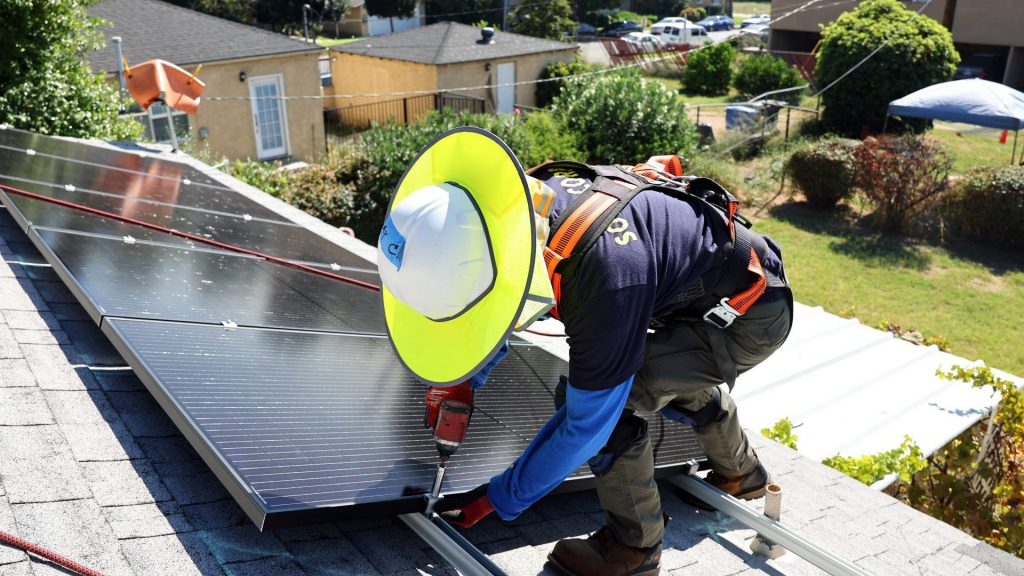California Supreme Court to decide fate of cuts to rooftop solar payments

A lawsuit before the California Supreme Court is pitting homeowners with rooftop solar against the state public utility commission and major private utility companies. The case centers on a 2023 rule that significantly reduced how much utilities pay for power generated by homes and small businesses.
The Center for Biological Diversity, along with two other environmental groups, filed a lawsuit at the end of 2022 against the California Public Utilities Commission over changes to the state’s net-metering policy, which determines how much rooftop solar owners get reimbursed on their utility bills. Major private utility companies Pacific Gas and Electric, San Diego Gas and Electric and Southern California Edison are defendants in the suit, along with the utilities commission.
California has some of the highest electricity costs in the country. At the same time, the state is pursuing a policy of generating 100% of its energy from zero-emission sources by 2045. Advocates for rooftop solar say it helps keep energy costs down while helping the state reach its environmental goals.
Utility companies have argued that rooftop solar owners were receiving excessive compensation at the expense of electric ratepayers without solar systems. The court decision could affect the trajectory of rooftop solar adoption, which has doubled in California since 2020.
How did the commission change solar rates?
The commission and utility companies have stated that the previous net energy metering program disproportionately shifted maintenance costs, effectively increasing electricity bills for homes that do not have solar panels. In official documents, the commission stated it made the changes to “control costs for all ratepayers” while still encouraging rooftop solar adoption.
“The former (net metering) system was unsustainable because of the burden that it was placing on customers without solar,” Mica Moore, an attorney for the utilities commission, said in an article for CalMatters.
California has more rooftop solar than any other state, with 24% of homes having solar panels, according to the Solar Energy Industries Association.
Before the changes took effect, utility companies paid homeowners the retail rate — the same rate they charged other customers — for electricity generated from rooftop solar. With the new rules, the owners of any rooftop solar system installed after mid-April 2023 are only eligible to receive the “avoided costs” for the utility, which is a calculation of how much money the utility company would have had to spend to generate that amount of electricity on its own.
What are California rooftop solar advocates saying?
Unbiased. Straight Facts.TM
California leads the nation in rooftop solar installation, with 24% of homes equipped with solar panels, according to the Solar Energy Industries Association.

The shift from retail value to avoided cost led to a 70%–80% drop in compensation for rooftop solar owners, according to the California Solar and Storage Association.
Roger Lin, a senior attorney for the Center for Biological Diversity, said the dramatic reductions are due in part because the utilities commission’s calculations for the avoided costs are a “big black box.”
“The avoided cost calculator was never intended to measure the benefits of rooftop solar,” Lin said in an interview with Straight Arrow News.
He said the new policy has “severely diminished” new rooftop solar development, particularly for less affluent communities where the cost of installing solar panels is no longer worth the savings on electricity.
In a February 2024 press release, the California Solar and Storage Association said that since April 2023, it has seen an 87% reduction in new rooftop solar installations, resulting in the industry laying off 17,000 workers.
Where does the lawsuit go next?
The California Supreme Court heard arguments Wednesday, June 4, on whether to give deference to the utilities commissions’ decision to change net metering. The plaintiffs maintain that the commission overreached its regulatory authority by unilaterally making such changes. They also argued that the commission failed to properly consider the broader benefits of rooftop solar.
If the plaintiffs win both of their arguments, the commission will have to revert to the previous net metering rules. If the court rules entirely in the commission’s favor, the 2023 changes to net metering will remain in effect.
A split outcome could trigger additional legal processes to determine if the 2023 rules effectively weighed the costs and benefits of rooftop solar. To force the commission to revert to previous net metering rules, the plaintiffs would have to win. The court has 90 days to issue a ruling.





